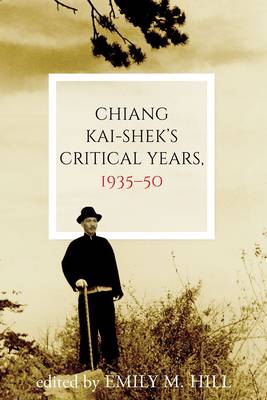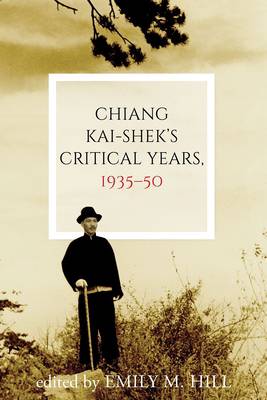
- Afhalen na 1 uur in een winkel met voorraad
- Gratis thuislevering in België vanaf € 30
- Ruim aanbod met 7 miljoen producten
- Afhalen na 1 uur in een winkel met voorraad
- Gratis thuislevering in België vanaf € 30
- Ruim aanbod met 7 miljoen producten
Zoeken
Chiang Kai-Shek's Critical Years, 1935-50
€ 74,45
+ 148 punten
Omschrijving
Analyzes an enigmatic figure at the peak of his influence in China, showing how his improvisational approach to political problems brought remarkable successes, but also ultimate defeat. From 1935 to 1950, Chiang Kai-shek steered China's development as a nation and shaped global history, yet he remains an enigmatic figure remembered primarily for losing a brutal civil war. A reinterpretation is overdue. Chiang Kai-shek's Critical Years sheds new light on his call for mobilization against Japan in 1937 and his relations with US representatives during the war, his efforts first to accommodate and then to defeat the Chinese Communist Party, and his ability to hold on to the presidency of the Republic of China after 1949, despite disastrous military failure. This examination of Chiang's daily planning and reflection on events reveals astute improvisation that ensured political survival despite setbacks and weaknesses. The sharpened sense of Chiang's agency that emerges from this important study provides an invaluable foundation for further analysis of the military and political institutional structures he helped build.
Specificaties
Betrokkenen
- Uitgeverij:
Inhoud
- Aantal bladzijden:
- 280
- Taal:
- Engels
- Reeks:
Eigenschappen
- Productcode (EAN):
- 9780774870276
- Verschijningsdatum:
- 10/04/2025
- Uitvoering:
- Hardcover
- Formaat:
- Genaaid
- Afmetingen:
- 152 mm x 229 mm
- Gewicht:
- 453 g

Alleen bij Standaard Boekhandel
+ 148 punten op je klantenkaart van Standaard Boekhandel
Beoordelingen
We publiceren alleen reviews die voldoen aan de voorwaarden voor reviews. Bekijk onze voorwaarden voor reviews.










